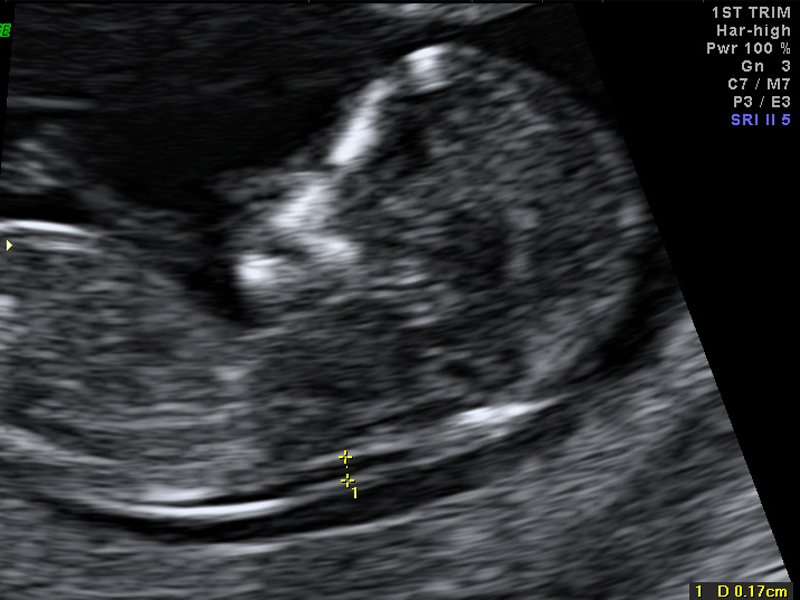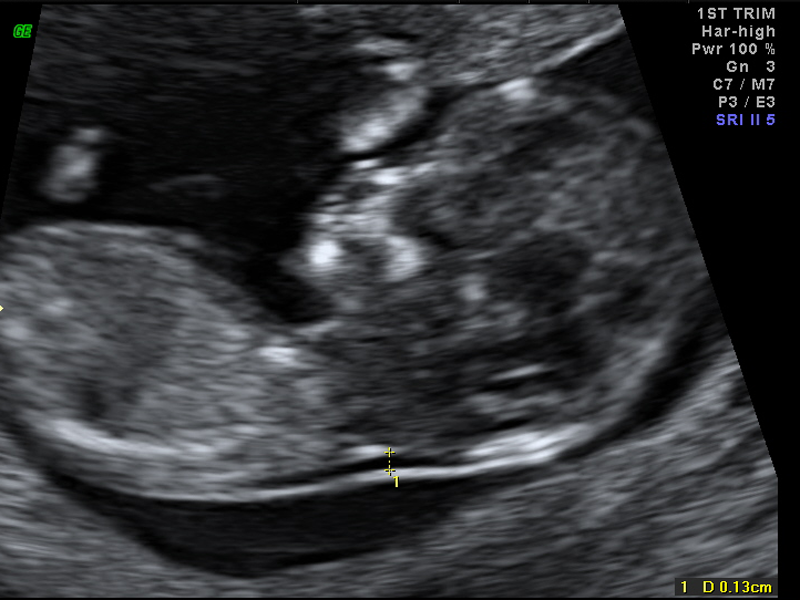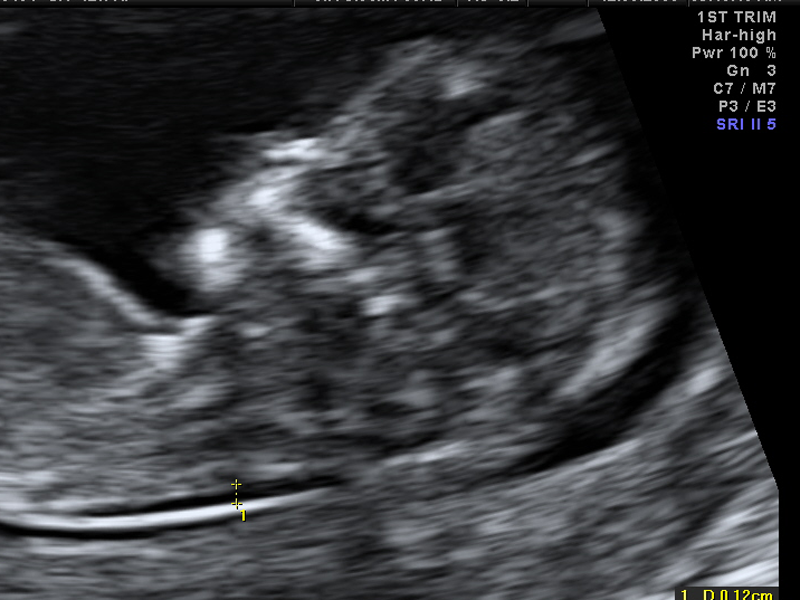
Why do I need an ultrasound when I’m pregnant?
As your pregnancy develops, it’s important to learn critical information such as how many babies you’re carrying and when your baby is due (and that’s just the start).
If there are any issues with your pregnancy (such as the position of the baby, the location of the placenta or umbilical cord), it’s best to know about these things as early as possible.
Getting the right start for your baby
We offer a number of tests – some invasive and some less so.
Generally we recommend that you have a nuchal translucency scan at 12-14 weeks of gestation and a morphology scan at 18-20 weeks of the pregnancy.
In a nuchal translucency scan, we measure the level of fluid in your baby’s neck using ultrasound. All babies have some fluid in the back of their necks; however, babies with Down Syndrome tend to have more.
Another test that helps us to assess any risk of a fetal chromosomal abnormality in your baby is Non-Invasive Prenatal Testing (NIPT). NIPT is a safe, highly accurate prenatal blood test that analyses cell-free fetal DNA in your own blood to detect any fetal chromosomal abnormalities.
Should we find a problem (either chromosomal or physical) then we might ask that we do more testing such as CVS or amniocentesis.
We care for you and your baby
We always carefully counsel our patients when we identify any risks – before we continue with any invasive tests.
Fortunately, most of the time the test results are normal.
NOTE: While these types of testing can accurately determine a chromosomal abnormality, it is important to understand that no prenatal diagnosis test can tell us how severely affected a baby with a chromosomal abnormality might be. Also, this type of testing will not be able to exclude all abnormalities even if the chromosomes are normal.
This is a safe, non invasive and highly accurate prenatal test which can be performed from about 10 weeks of pregnancy. It only requires a maternal blood test and carries no risk of miscarriage to the pregnancy.
This test analyses the fetal DNA extracted from the maternal blood and is highly accurate for the diagnosis of chromosome abnormality, in particular Down syndrome. It currently tests for Down Syndrome, Trisomy 18 and 13 and the sex chromosomes. It can be used in twin pregnancies. However, it does not test for all chromosome abnormalities.
Interpretation of the NIPT test must be undertaken by an experienced obstetric specialist or geneticist. The results must be interpreted in conjunction with the Nuchal translucency scan and morphology ultrasound examinations. Positive or abnormal NIPT test results usually need to be confirmed by either CVS or amniocentesis
This test is not currently eligible for a medicare rebate and costs about $500.
Generally the problems that babies are born with can be divided into three groups: physical, chromosomal or genetic.
Physical problems can vary greatly in severity and occur in about 1 in 100 pregnancies. They can occur in any age group and are rarely inherited or passed on from the parents. These are usually diagnosed at the 12 week Nuchal Translucency screen or the 20 week morphology scan.
Babies can be born with chromosome abnormalities and the risk is increased as the mother becomes older. In NSW, a chromosome abnormality is diagnosed in about 1:800 pregnancies but the level of risk varies with the age of the mother.
Testing for chromosome abnormalities is available to any pregnant woman. The simplest and safest test is the 12 week Nuchal Translucency screen which provides an assessment of the level of risk for that particular pregnancy. This test carries no risk to the pregnancy as it is completely non invasive. The new Non Invasive Prenatal Test (NIPT) can help to diagnose chromosome abnormalities from a blood test for the mother.
Further invasive testing such as CVS or amniocentesis is required to accurately diagnose any chromosome abnormality and is recommended for patients who
- have a high risk result ie > 1:300 on a prenatal screening test such as the nuchal translucency assessment at 12-14 weeks
- have a fetal abnormality diagnosed at an ultrasound examination
- have an abnormal NIPT
- have a family history of a genetic disorder
- Some women aged 35 and over may decide to have a test because of their age
Genetic diseases such as cystic fibrosis are fortunately rare, occurring in less than 1:2000 babies. Tests such as CVS or amniocentesis can be used to diagnose these inherited conditions if they have been already identified in the family
This is a simple non invasive test best performed between 12-14 weeks of pregnancy to assess the risk of having a baby with a chromosome abnormality.
This test allows up to 95% of babies with Down syndrome and other abnormalities to be identified. This test uses a combination of a scan and a blood test and must be performed in an accredited Fetal medicine centre.
How is the test done? A Transabdominal ultrasound examination measuring the thickness of a layer of fluid at the back of the baby’s neck is performed. The presence of the nasal bone is also assessed as are the baby’s heart valves. This helps to make the test more accurate. Some patients may need a transvaginal examination to allow this measurement to be done correctly. This test is not an invasive procedure for your baby and does not carry any risk of miscarriage.
The blood test: measures PAPP-A and free BHCG, two pregnancy related proteins, produced by the placenta and must be tested between 10 and 13 weeks of pregnancy.
How does the test assess the risk of abnormality? Studies of over 100,000 pregnancies in women of all ages have shown that up to 95% of babies with Down syndrome or other abnormalities can be identified. A special computer program is necessary to calculate this risk and takes into account the results of the blood test, NT measurement, the mother’s age, the stage of pregnancy and any previous baby born with a chromosome abnormality.
What does a high risk result test mean? A high risk result does not automatically mean that a baby is abnormal. A risk greater than 1 in 300 is considered high and this may occur in about 1 in 20 patients. Further testing such as CVS (Chorion Villus Sampling) done at 12-14 weeks or amniocentesis done at 15-16 weeks is usually recommended. The NIPT can also be used to assess the risk of chromosome abnormality in the baby.
A high risk test result, in a baby with normal chromosomes, can indicate an increased risk of a fetal heart abnormality and concerns with the growth of the baby during the pregnancy. Careful assessment of the baby is usually recommended at 16 and 20 weeks of pregnancy.
What does a low risk result test mean? A risk of lower than 1 in 300 suggests a low chance of chromosome abnormality for your baby but this DOES NOT mean no risk.
The baby and placenta share the same chromosomes and placental cells can be tested to determine the chromosome make-up of the baby.
This test is usually performed between 11 and 14 weeks of gestation. This test is very accurate but carries a slight risk of causing a miscarriage.
How is the test performed? At this practice most of the tests are performed transvaginally under ultrasound control. A thin metal catheter is passed through the cervix and placental cells obtained. The level of discomfort is low and similar to that of a pap smear. Sometimes the placenta is difficult to reach through the cervix and a fine needle can be inserted through the abdominal wall into the placenta to obtain a similar tissue sample.
How soon are the results available? Preliminary results can be obtained in 24-48 hrs for Down syndrome and some of the commonest abnormalities using a method called Fast FISH (Fluorescent in situ hybridisation). This test looks specifically at the number of chromosomes 21, 18, 13, X and Y which cause about 80% of the possible abnormalities. This test carries an extra cost of $200 which is billed by the testing laboratory.
The final results are usually available in 10-12 days. The test is highly accurate with an error rate of much less than 1%.
What is the risk of this test to my pregnancy? At this practice, the risk of miscarriage from this procedure is less than 1:400. The risk is highest in the first week after the test and can be minimised by reducing strenuous physical activity during that time. The risks are dependent on the build of the mother, the position of the placenta and the experience of the doctor performing the test.
This test is usually performed at 15-16 weeks of gestation. Using ultrasound guidance, a fine needle is inserted into the pregnancy sac to obtain fluid from around the baby.
This fluid contains cells from the baby’s skin which can then be grown in culture and provide the chromosome make up of the baby.
How soon are the results available? Preliminary results can be obtained in 24-48 hrs for Down syndrome and some of the commonest abnormalities using a method called Fast FISH (Fluorescent in situ hybridisation). This test looks specifically at the number of chromosomes 21, 18, 13, X and Y which cause about 80% of the possible abnormalities. This test carries an extra cost of $200 which is billed by the laboratory.
The final results are usually available in 10-12 days. The test is highly accurate with an error rate of much less than 1%.
What is the risk of this test to my pregnancy? At this practice, the risk of miscarriage from this procedure is less than 1:500. The risk is highest in the first week after the test and can be minimised by reducing strenuous physical activity during that time. The risks are dependent on the build of the mother, the position of the baby but also the experience of the doctor performing the test.
This test is now rarely used due to a lower level of accuracy. The nuchal translucency test is much more accurate and can be performed earlier in the pregnancy.
The triple test is a blood test done for mothers between 15-17 weeks of pregnancy which can be helpful in identifying babies with Down syndrome or other chromosome problems. However this is only a screening test and cannot directly diagnose babies with a chromosome abnormality.
How is the test performed? The blood is tested for the levels of alpha-fetoprotein, human chorionic gonadotrophin, and unconjugated estriol. These pregnancy proteins are produced by the placenta of all pregnant women and not only those with a chromosomal abnormality. Between 50% and 60% of fetuses with Down syndrome can be identified by this test.
How soon are the results available? The results are usually obtained within a few days and the results are sent to your doctor.
What is the risk of this test to my pregnancy? There is no risk to the pregnancy as this is simply a blood test for the mother.
What does a high risk result mean? A high risk result (higher than 1:300) means that that the baby may have a chromosome abnormality and that further testing is required. This is usually done by amniocentesis which carries a slight risk of miscarriage.
Are you ready to take care of you?
Make an appointment now to visit us. Call 02 4957 3899 or complete the contact form.


